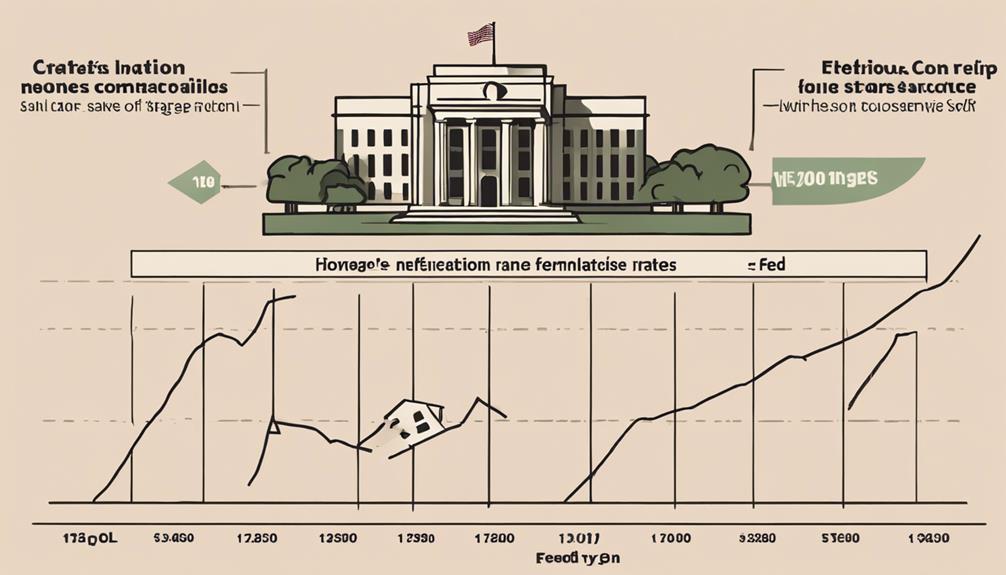You may not be aware that having a higher credit score could potentially lead to increased mortgage fees or rates. This new trend in the lending industry has left many borrowers wondering how their responsible financial habits could now be working against them.
As you delve further into the reasons behind this shift, you will uncover the complex interplay between credit scores, lender risk assessments, and market dynamics, shedding light on the strategies you can employ to navigate these evolving challenges successfully.
Impact of Rising Credit Scores
As your credit score rises, you can expect to see a direct impact on the fees associated with obtaining a mortgage. Lenders often offer lower interest rates and reduced fees to borrowers with higher credit scores.
A good credit score indicates to lenders that you’re a responsible borrower, lessening the risk for them. This reduced risk translates into financial benefits for you. With a higher credit score, you may qualify for loans with lower down payments, lower interest rates, and potentially fewer fees.
It’s essential to maintain a good credit score by making timely payments, keeping your credit card balances low, and avoiding opening multiple new accounts. Your efforts to improve your credit score won’t only benefit your financial health but also save you money in the long run.
Factors Driving Higher Fees
With increasing mortgage fees, understanding the factors that drive these costs is crucial for borrowers seeking to optimize their financial decisions. Several key elements contribute to the higher fees you may encounter.
Lender fees, such as origination charges and processing costs, play a significant role. Your credit score and financial history also influence the fees you’re charged. Additionally, the type of mortgage you choose, whether fixed-rate or adjustable-rate, can impact the cost.
Market conditions and interest rates prevailing at the time of your application further affect the fees. By being aware of these factors and how they impact your mortgage expenses, you can make informed decisions to potentially reduce costs and save money in the long run.
Understanding Lender Perspectives
To gain insight into mortgage fees and their implications, consider the perspective of lenders in assessing loan applications. Lenders view credit scores as a reflection of risk. Higher credit scores typically signal responsible financial behavior, making borrowers less risky. In turn, this can lead to lower interest rates and fees.
On the other hand, lower credit scores may indicate a higher risk of default, prompting lenders to mitigate this risk by charging higher fees or interest rates. Lenders assess various factors beyond just credit scores, such as income stability, debt-to-income ratio, and employment history.
Strategies for Mitigating Costs
One effective approach to reducing mortgage costs involves optimizing your credit score through timely bill payments and credit utilization management. By ensuring you pay your bills on time and keep your credit card balances low, you can boost your credit score, which may qualify you for better mortgage rates.
Another strategy is to shop around and compare offers from different lenders to find the most competitive rates and fees. Additionally, consider putting down a larger down payment to lower your loan amount and potentially decrease your interest rate.
Navigating the New Mortgage Landscape
Successfully navigating the evolving mortgage landscape requires staying informed about current market trends and lender requirements. Keep in mind that different lenders may have varying criteria and offerings.
Research various mortgage options and compare rates from multiple lenders to ensure you’re getting the best deal. Be prepared to provide detailed financial information and documentation to support your mortgage application. Understanding your credit score and how it impacts your borrowing capabilities is crucial.
Consider seeking pre-approval to show sellers you’re a serious buyer. Remember to factor in all costs associated with the mortgage, including fees and potential rate adjustments. By being proactive and well-informed, you can navigate the new mortgage landscape with confidence.
Conclusion
So, if you’re looking to secure a mortgage with a higher credit score, be prepared to potentially face higher fees or rates.
It’s important to understand the factors driving these costs and consider different strategies for mitigating them.
By navigating the new mortgage landscape with this knowledge in mind, you can make informed decisions and potentially save money in the long run.




